This interview was originally published on chicagopoetry.com.
John Sinclair has been in the public limelight for over thirty years. He has been a poet, a political activist, a Blues Scholar, and a radio DJ. He first gained notoriety in the late ’60s when he founded the white panther party. The party was a Caucasian counterpart to the Black Panthers, and they supported most of the Black Panther agenda. The white panther party’s radical manifesto included such goals as abolishing private property as well as money. John Sinclair also served as the manager for the influential band The MC5 (Motor City Five), which paved the way for many of the politically charged rock bands which would follow. MC5 is often cited (along with the Stooges) as being a big influence on the late ’70s punk explosion. Sinclair’s management of the band ended with an arrest, however. Incredibly, he was sentenced to ten years in prison for giving a few joints to an undercover cop. John Lennon wrote about the hypocrisy of the situation in the song “John Sinclair” which is included on “John Lennon Anthology.” Most recently, John Sinclair has performed and recorded as a poet with the Blues Scholars and he is known for his radio show on New Orleans’ WWOZ. Lately, Sinclair has become extremely disillusioned about the policies of the United States government, so much so that he has decided to move to Amsterdam. Before we would let John Sinclair go, Letter eX sent Chicago’s very own art interviewer, Vittorio Carli, to have a talk with him.
VC: How did you get involved with poetry?
JS: When I went to Albion College in Michigan I was an R and B fanatic. I loved my 45-rpm singles from Specialty and Atlantic. There I met a guy who turned me on to jazz and poetry; he turned me on to Allen Ginsberg, Lawrence Ferllinghetti, Jack Keroauc, and Gregory Corso. That was around 1959.
VC: Did you meet any of the beat poets?
JS: In the 60s, I met many poets. I went to the Berkley Poetry Conference in 1965. I studied with Charles Olson, Robert Duncan, Ed Dorn and Allen Ginsberg. Gary Snider, Jack Spicer, and Philip Whalen were also there. There were many great poets around.
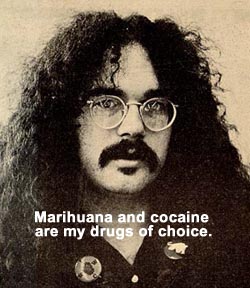 VC: Do you have any favorite contemporary poets?
VC: Do you have any favorite contemporary poets?
JS: I love Jayne Cortez. Amiri Baraka is my idol and my friend.
VC: What did you think of the recent controversy regarding Amiri Baraka?
JS: I really think they should have read his poems before they made him poet laureate or they should have accepted their own ignorance. That poem had been published in 2001, long before they gave him the award. Baraka even said, “You should’ve read my poems.” If they dug they probably would have found poems that would be even more offensive to them than “Someone Blew Up America,” which is one of the greatest poems of our time. Baraka shouldn’t just be poet laureate of New Jersey; he should be poet laureate of the whole country. Basically people that were offended by his Israel references put the pressure on the politicians.
VC: Do you use musical rhythms in your work?
JS: I set my verses to music; the most important part is rhythm. Olson said, “A foot is to kick with.” So I am concerned with rhyme and musical themes. I write verse about great musical figures like Theolonius Monk, Charlie Parker, Dizzy Gillespie, and Muddy Waters.
VC: You wrote a poem about how Ginsberg gave Monk acid.
JS: Yes, I came across an anecdote about it. I read it to him and I got to confer with him about it. It happened when Ginsberg was on a mission to turn all the great artists onto acid. So he took some acid to Monk.
VC: Is your work influenced by drugs?
JS: Well, I make my living such as it is writing about music, and I never write without the influence of pot. I tried to do it without the pot, but it didn’t swing merely as well. I also had early psychedelic experiences in the ’60s. It altered the course of my mind and my life. I’ve been on that course ever since. Marihuana and cocaine are my drugs of choice. I don’t bother with anything else.
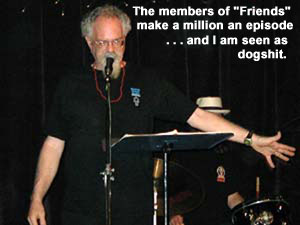 VC: Do drugs affect your images or your poetic subjects?
VC: Do drugs affect your images or your poetic subjects?
JS: That’s for critics to decide. I spent more time creating and editing than trying to understand it all. I don’t really know why I write one thing or another.
VC: You got an uncommonly long prison sentence for marihuana possession.
JS: I was sentenced to nine to ten years for a few joints. I served 29 months until a large-scale agitation got me out of prison. Then the Supreme Court overturned my conviction. This was 1972.
VC: What are some of your recent projects?
JS: A year ago, I published a blues work I have been involved with for 20 years. It’s called “Fattening Frogs for Snakes.” It came out from the Surregional Press in New Orleans. I also made a recording of the first part of it with my band, the Blues Scholars, produced by the great Chicago resident, Andre Williams. I mostly just make records. I don’t care if my work appears in poetry magazines. Although I just had a big poem published in a newspaper, “The Detroit Metro Times.” They published a poem I wrote on the war on drugs. I made about 10 albums, but of course none of them stay in print. I have another album that I am trying to get out now called “It’s All Good.” I made it with Dutch hip-hop musicians in Amsterdam called the D-Men. They rap in Dutch.
VC: Do you think that some of the rappers are extending the traditions of the last poets and other political poets?
JS: I don’t like to talk about things I don’t care for. I think most hip-hop is extending the tradition of Mother Goose. I hate rhymed poetry. I have hated it all my adult life.
VC: What about traditional poetic forms?
JS: I don’t even like Robert Frost. I’m a follower of Charles Olson and the concept of projective verse. In the words of Robert Creeley. “Forms should never be more than an extension of content.” I try to extend what I’m writing about into the form it takes for itself. That’s as far as I get with line breaks and all that kind of stuff
VC: Tell us about your political activism.
JS: I’ve retired from activism per se about 30 years ago. The ten years previous to that I was a cultural activist and an organizer, and then a political organizer. I was dedicated to the overthrow of the United States. I still think that there should be bartering or free exchange instead of money, but I don’t care about that much now, in fact I’m leaving here. I’m going to Amsterdam.
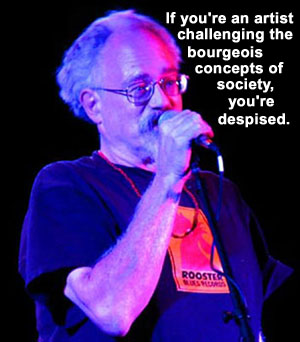 VC: What is it about Amsterdam that you like?
VC: What is it about Amsterdam that you like?
JS: The people are more civilized. The scale of things is smaller. That’s the way I like it. The people are very tolerant of other people. Not so much in a mental sense but in physical sense. They might not necessarily approve of what you do. But not only will they tolerate it but also they’ll provide you with the means and opportunities to do it. I have people that want me to be there. That makes the country attractive to me. They pay people to be philosophers there. Someone told me they wanted me on a Dutch panel discussion with three philosophers. I laughed and told him “In America, we don’t have philosophers anymore.” But in Holland, people get paid by the state to think. I like that and I want to be in that number. Artists get health care there!!!!
VC: How did you come to manage the MC5?
JS: I knew the lead singer, Rob Tyner, and I was a follower of the band. I thought they were terrific. I saw them every time they played around Detroit. Then the Grateful Dead came to Detroit in 1967: it was their first national tour. I hung around with Rod Scully and Danny Rifkin, their managers. And I found out that they were even farther out than I was, yet they were managers handling a national tour. This made me think that I could do it too. I felt the MC5 needed someone that would do that for them. I just started to do the functions of a manager that would serve them properly. I used my own common sense and took charge.
VC: Tell us about the notorious censorship incident with Hudson’s.
JS: Well, they wouldn’t stock our records so we advised our followers to give them a hard time. They wouldn’t carry the MC5: they were treated like 2 Live Crew. They even arrested clerks selling our stuff. It was because the word “motherfucker” was in a song and in the liner notes. Our label didn’t support us when they got into trouble so we went to another label, Atlantic. Jon Landau was our producer at Atlantic who later produced Springsteen, but while I was in prison I lost touch with everyone.
VC: Do you still associate with any of the former MC5 members?
JS: Wayne Kramer and I are close. I collaborated with him on some recordings and performances.
VC: Many critics claim that the MC5 paved the way for political punk bands like the Clash, Sex Pistols and Chelsea. Do you think that’s true?
JS: I never saw the connection. They always claim the MC5 helped start punk rock because of the attitude. But they didn’t just have attitude. There was a certain intelligence in the band. They made a pointed critique of society and people responded. They organized public opinion and raised money for activists. I don’t think Johnny Thunders and the Sex Pistols did much of that.
VC: Do you think The Clash tried to raise political consciousness?
JS: The Clash came to the United States and played for 10 days in New York City. They figured people could come out there if they wanted to see them. I thought this was an act of pure hubris. The MC5 weren’t like that. They went to the people. I’ve been out of pop culture for thirty years though. Pop culture has been the biggest disappointment of my lifetime. It used to be a wonderful revolutionary tool. Now it’s a bunch of chumps who pay $300 to see The Who. It’s now just another empty consumer culture.
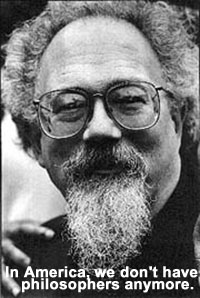 VC: In an episode of “Friends” Jennifer Anniston wears an MC5 shirt. Does any of the money from the shirt sales go to the members?
VC: In an episode of “Friends” Jennifer Anniston wears an MC5 shirt. Does any of the money from the shirt sales go to the members?
JS: No, it’s a rip-off. It is flattering though. But look at the world we live in. The members of “Friends” make 1 million an episode. They are cherished and valued by our society, and I am seen as dog shit. I get no recognition here. I’m a poet and I can barely pay my rent. I’d like to see the MC5 get some benefit. All the bands that idolize them are fantastically wealthy. Every one else got paid except the band. The records didn’t see well.
VC: There must be some profit from cumulative sales. The MC5 records have been in print for decades.
JS: We didn’t see any of it. I never even had a contract.
VC: Tell us about your radio show.
JS: The show is over. I resigned from it when I left New Orleans. For ten years I hosted the blues show at a New Orleans station. I played records. Good records. No pop records.
VC: What do you think about play lists and the increased corporate control of radio stations?
JS: That’s been going on since they started top 40 in the ’50s except in that brief period of underground radio in the ’60s. It was quickly bought out. Radio stations are pretty lame except for college stations, generally speaking. The station I was on is an exception. The Jazz Heritage Foundation of New Orleans owns it. Our mission is to play jazz and heritage music from New Orleans and Louisiana.
VC: What were some of the artists you played on your station?
JS: On the New Orleans show, I played everything from Dixieland to modern jazz including Lee Dorsey, New Orleans Nightcrawlers, Irma Ruffin, the Tropic Brass Band, Wild Magnolias, Professor Longhair. On the blues show, I played Walter Wolfman Washington, Little Freddie King. Also, lots of people from Chicago like Magic Slim and the Teardrops and all the classics like Howlin Wolf and Muddy Waters. I love playing records for people and reading my work in public. Those are my two favorite public activities.
VC: Is there any chance you might continue doing the show in Amsterdam?
JS: Hopefully I can get something going there. I have a patron there that wants me to move. He wants to help me with the costs and offered to help me get artist status from the government. That’s the best offer I ever had. Nothing like that will ever happen here. Art is despised in my society. Look at Karen Finley. She’s a great example. She tried to do something innovative. And they tried to humiliate her and strip her of her grant money. But if you’re a wrestler, you can be a governor of a state. If you’re the Terminator, you can become governor of California. But if you’re an artist challenging the bourgeois concepts of society, you’re despised. Look at what happened to Baraka. It’s all about greed. It’s not enough to take everything in our country; we have to take from other countries too.
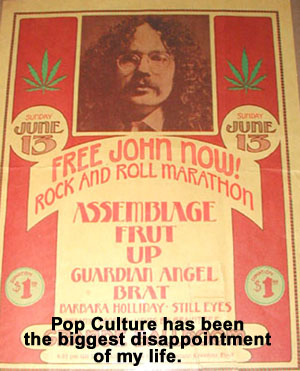 VC: What do you think of the Iraq conflict?
VC: What do you think of the Iraq conflict?
JS: It’s all so nebulous. They want to get rid of all these terrible awful people but they were all on the government payrolls five years ago.
VC: What did you think about Nader and the Green Party?
JS: They mostly took away votes from the democrats. I haven’t heard much from Nader after the election ended.
VC: Do you think the Internet will have an increased role in disseminating alternative information?
JS: It’s all we have. But the government also will have access to all the info that travels on-line. When and if they want to do something about it they can pinpoint it. I’m leery of Ashcroft. They don’t believe in what we believe in.
VC: Is there anything else you wanted to say about future projects?
JS: I just hope I can keep working and eeking about a living by doing poetry and writing about music.